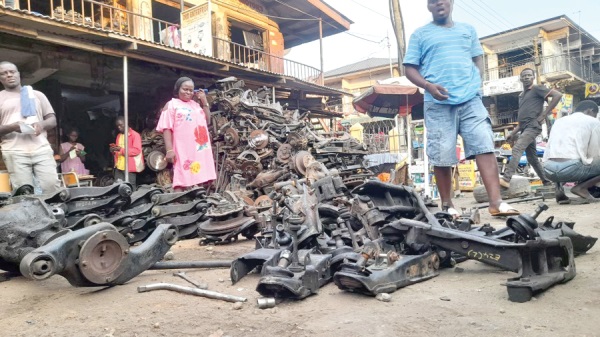The scrap metal industry is reckoned to be a multibillion-cedi enterprise; however, the industry’s unregulated nature leaves a lot to be desired.
Without doubt, the scrap metal sector is a critical component of the domestic steel industry – but its strategic importance is undermined because the industry remains largely informal and undocumented.
As there is no commercially viable iron ore production to feed local steel mills, the country’s manufacturers rely almost entirely on scrap metal to produce iron rods and anvils – key inputs for the construction industry.
This unchecked market is therefore rife with theft, tax avoidance and hazardous practices. Consequently, people are stealing drain covers, electrical components and even dismantling machinery under the guise of scrap retrieval.
Beyond infrastructure theft, safety concerns abound. Trucks carrying scrap are often overloaded and insecure – spilling sharp metal debris onto highways and endangering other road users.
Additionally, the indiscriminate burning of wires to extract copper contributes to air pollution and poses health risks for nearby communities.
Scrap dealers currently operate with minimal accountability and many do not remit any form of tax beyond token fees paid at the municipal level.
It is in view of this that the Ghana Integrated Iron and Steel Development Corporation (GIISDEC) has begun efforts to introduce a mandatory licencing regime targetting scrap dealers and exporters.
The new regulation is intended to curb theft, environmental damage, reduce tax evasion and protect national infrastructure, which has increasingly come under threat from unregulated scrap collectors.
The yet-to-be-finalised licencing policy will require all players in the scrap value chain – including collectors, middlemen, exporters and buyers – to register with a new oversight framework being developed by GIISDEC in partnership with the Ministry of Local Government and Attorney-General’s Department.
Williams Okofu-Dateh, Chief Executive Officer-GIISDEC, notes that steelmakers in Ghana supply over 70 percent of the iron rods used nationally and all are derived from scrap. Indeed, environmental and fiscal considerations are central to the new regulatory drive.
The licencing framework aims to formalise the industry and channel more revenue to government coffers through proper taxation and traceability.
The regulation is also expected to bring structure into the market’s export segment. Currently, some dealers smuggle scrap metal out of the country through informal channels; thus depriving local steel plants of raw materials.










